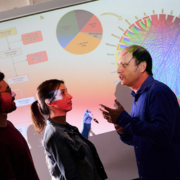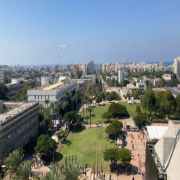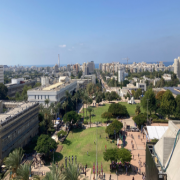Moderate decline in violent attacks against Jews, but attacks more brutal
Jews living in Europe harbor increasingly ‘grave concerns for their security,’ annual Tel Aviv University Kantor Center study reports
Anti-Semitic violence around the world dropped 9%, from 361 incidents in 2016 to 327 incidents in 2017. But a “dramatic increase” of all other forms of anti-Semitic manifestations, including harassment and hate speech, has evoked rising “grave concerns among Jews regarding their security and the continuation of communal life,” according to the annual report by Tel Aviv University’s Kantor Center for the Study of Contemporary European Jewry, published on Wednesday, April 11.
The report did not include figures on anti-Semitic incidents in France, as the information was not available when the report went to press.
“2017 was year in which many Jews, particularly in Europe, suffered,” Dr. Moshe Kantor, President of the European Jewish Congress, told reporters at a press conference held at Tel Aviv University on Wednesday. “Both the public and private sectors are seen as unsafe for Jews. As demonstrated by the brutal murder of Mireille Knoll in her home in Paris, the general feeling of Jews is that anti-Semitism has now entered their homes. While there was a 9% decrease in violent attacks against Jews worldwide, this fact was overshadowed by a dramatic rise in other manifestations of anti-Semitism.
“To live in many parts of Europe as a Jew today is to live in a fortress. Jewish parents are confronted with the task of explaining to their children that they have to move from their school, behind thick glass, to their community center, behind barbed wire. Jews fear for their safety even in their own homes. The normalizing and banalizing of anti-Semitism has reached historic levels.”
“Why are we talking about a general decrease in violent anti-Semitic attacks when the feeling is different?” said Prof. Dina Porat, Head of the Kantor Center and Chief Historian of Yad Vashem. “The situation in France is very delicate. Just consider the case of Sara Halimi, whose brutal murder was not considered an ‘anti-Semitic’ attack by French authorities. The cases themselves are becoming more brutal – there is more murder. The nature of the violence is harsher and more brutal. There is an intensification of harassment in school, many more manifestations that are very difficult to count or estimate, because they are severely underreported.”
The Kantor Center’s annual report, a global overview of anti-Semitic incidents, is based on surveys conducted by recognized watchdogs from dozens of countries, including nearly all European Union member states. According to the report, “The anti-Semitic atmosphere has become a public arena issue, intensively dealt with vis-à-vis the triangle made of the constant rise of the extreme right, a heated anti-Zionist discourse on the left, accompanied by harsh anti-Semitic expressions, and radical Islam.”
"People in Europe are on the frontlines, they are dealing with anti-Semitism," Prof. Porat said. “The word Jew has come back to the floor as a bad word. But we are not alone. There are other minorities that are suffering. Many other hate speech targeting others. We should suggest a coalition, an umbrella organization to work together in this fight, extending a hand to other groups who are suffering, like moderate Muslims and the Roma.”
“We need to strengthen the tools with which the governmental agencies fight anti-Semitism,” concluded Dr. Kantor. “We need a pragmatic road map to fight this, and we need to limit our tolerance for those individuals who reject the principles of tolerance. We cannot fight anti-Semitism as if it is just a Jewish problem.”






